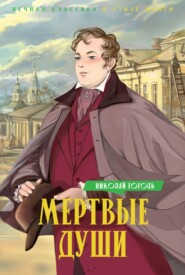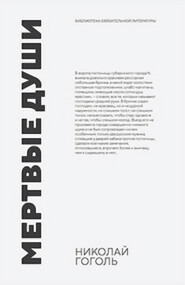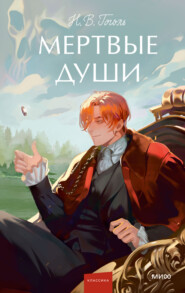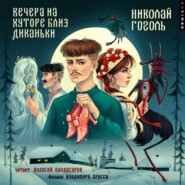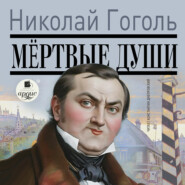По всем вопросам обращайтесь на: info@litportal.ru
(©) 2003-2025.
✖
Taras Bulba, and Other Tales
Год написания книги
2018
Настройки чтения
Размер шрифта
Высота строк
Поля
Akakiy Akakievitch, having hung up his own cloak, entered the inner room. Before him all at once appeared lights, officials, pipes, and card-tables; and he was bewildered by the sound of rapid conversation rising from all the tables, and the noise of moving chairs. He halted very awkwardly in the middle of the room, wondering what he ought to do. But they had seen him. They received him with a shout, and all thronged at once into the ante-room, and there took another look at his cloak. Akakiy Akakievitch, although somewhat confused, was frank-hearted, and could not refrain from rejoicing when he saw how they praised his cloak. Then, of course, they all dropped him and his cloak, and returned, as was proper, to the tables set out for whist.
All this, the noise, the talk, and the throng of people was rather overwhelming to Akakiy Akakievitch. He simply did not know where he stood, or where to put his hands, his feet, and his whole body. Finally he sat down by the players, looked at the cards, gazed at the face of one and another, and after a while began to gape, and to feel that it was wearisome, the more so as the hour was already long past when he usually went to bed. He wanted to take leave of the host; but they would not let him go, saying that he must not fail to drink a glass of champagne in honour of his new garment. In the course of an hour, supper, consisting of vegetable salad, cold veal, pastry, confectioner’s pies, and champagne, was served. They made Akakiy Akakievitch drink two glasses of champagne, after which he felt things grow livelier.
Still, he could not forget that it was twelve o’clock, and that he should have been at home long ago. In order that the host might not think of some excuse for detaining him, he stole out of the room quickly, sought out, in the ante-room, his cloak, which, to his sorrow, he found lying on the floor, brushed it, picked off every speck upon it, put it on his shoulders, and descended the stairs to the street.
In the street all was still bright. Some petty shops, those permanent clubs of servants and all sorts of folk, were open. Others were shut, but, nevertheless, showed a streak of light the whole length of the door-crack, indicating that they were not yet free of company, and that probably some domestics, male and female, were finishing their stories and conversations whilst leaving their masters in complete ignorance as to their whereabouts. Akakiy Akakievitch went on in a happy frame of mind: he even started to run, without knowing why, after some lady, who flew past like a flash of lightning. But he stopped short, and went on very quietly as before, wondering why he had quickened his pace. Soon there spread before him those deserted streets, which are not cheerful in the daytime, to say nothing of the evening. Now they were even more dim and lonely: the lanterns began to grow rarer, oil, evidently, had been less liberally supplied. Then came wooden houses and fences: not a soul anywhere; only the snow sparkled in the streets, and mournfully veiled the low-roofed cabins with their closed shutters. He approached the spot where the street crossed a vast square with houses barely visible on its farther side, a square which seemed a fearful desert.
Afar, a tiny spark glimmered from some watchman’s box, which seemed to stand on the edge of the world. Akakiy Akakievitch’s cheerfulness diminished at this point in a marked degree. He entered the square, not without an involuntary sensation of fear, as though his heart warned him of some evil. He glanced back and on both sides, it was like a sea about him. “No, it is better not to look,” he thought, and went on, closing his eyes. When he opened them, to see whether he was near the end of the square, he suddenly beheld, standing just before his very nose, some bearded individuals of precisely what sort he could not make out. All grew dark before his eyes, and his heart throbbed.
“But, of course, the cloak is mine!” said one of them in a loud voice, seizing hold of his collar. Akakiy Akakievitch was about to shout “watch,” when the second man thrust a fist, about the size of a man’s head, into his mouth, muttering, “Now scream!”
Akakiy Akakievitch felt them strip off his cloak and give him a push with a knee: he fell headlong upon the snow, and felt no more. In a few minutes he recovered consciousness and rose to his feet; but no one was there. He felt that it was cold in the square, and that his cloak was gone; he began to shout, but his voice did not appear to reach to the outskirts of the square. In despair, but without ceasing to shout, he started at a run across the square, straight towards the watchbox, beside which stood the watchman, leaning on his halberd, and apparently curious to know what kind of a customer was running towards him and shouting. Akakiy Akakievitch ran up to him, and began in a sobbing voice to shout that he was asleep, and attended to nothing, and did not see when a man was robbed. The watchman replied that he had seen two men stop him in the middle of the square, but supposed that they were friends of his; and that, instead of scolding vainly, he had better go to the police on the morrow, so that they might make a search for whoever had stolen the cloak.
Akakiy Akakievitch ran home in complete disorder; his hair, which grew very thinly upon his temples and the back of his head, wholly disordered; his body, arms, and legs covered with snow. The old woman, who was mistress of his lodgings, on hearing a terrible knocking, sprang hastily from her bed, and, with only one shoe on, ran to open the door, pressing the sleeve of her chemise to her bosom out of modesty; but when she had opened it, she fell back on beholding Akakiy Akakievitch in such a state. When he told her about the affair, she clasped her hands, and said that he must go straight to the district chief of police, for his subordinate would turn up his nose, promise well, and drop the matter there. The very best thing to do, therefore, would be to go to the district chief, whom she knew, because Finnish Anna, her former cook, was now nurse at his house. She often saw him passing the house; and he was at church every Sunday, praying, but at the same time gazing cheerfully at everybody; so that he must be a good man, judging from all appearances. Having listened to this opinion, Akakiy Akakievitch betook himself sadly to his room; and how he spent the night there any one who can put himself in another’s place may readily imagine.
Early in the morning, he presented himself at the district chief’s; but was told that this official was asleep. He went again at ten and was again informed that he was asleep; at eleven, and they said: “The superintendent is not at home;” at dinner time, and the clerks in the ante-room would not admit him on any terms, and insisted upon knowing his business. So that at last, for once in his life, Akakiy Akakievitch felt an inclination to show some spirit, and said curtly that he must see the chief in person; that they ought not to presume to refuse him entrance; that he came from the department of justice, and that when he complained of them, they would see.
The clerks dared make no reply to this, and one of them went to call the chief, who listened to the strange story of the theft of the coat. Instead of directing his attention to the principal points of the matter, he began to question Akakiy Akakievitch: Why was he going home so late? Was he in the habit of doing so, or had he been to some disorderly house? So that Akakiy Akakievitch got thoroughly confused, and left him without knowing whether the affair of his cloak was in proper train or not.
All that day, for the first time in his life, he never went near the department. The next day he made his appearance, very pale, and in his old cape, which had become even more shabby. The news of the robbery of the cloak touched many; although there were some officials present who never lost an opportunity, even such a one as the present, of ridiculing Akakiy Akakievitch. They decided to make a collection for him on the spot, but the officials had already spent a great deal in subscribing for the director’s portrait, and for some book, at the suggestion of the head of that division, who was a friend of the author; and so the sum was trifling.
One of them, moved by pity, resolved to help Akakiy Akakievitch with some good advice at least, and told him that he ought not to go to the police, for although it might happen that a police-officer, wishing to win the approval of his superiors, might hunt up the cloak by some means, still his cloak would remain in the possession of the police if he did not offer legal proof that it belonged to him. The best thing for him, therefore, would be to apply to a certain prominent personage; since this prominent personage, by entering into relations with the proper persons, could greatly expedite the matter.
As there was nothing else to be done, Akakiy Akakievitch decided to go to the prominent personage. What was the exact official position of the prominent personage remains unknown to this day. The reader must know that the prominent personage had but recently become a prominent personage, having up to that time been only an insignificant person. Moreover, his present position was not considered prominent in comparison with others still more so. But there is always a circle of people to whom what is insignificant in the eyes of others, is important enough. Moreover, he strove to increase his importance by sundry devices; for instance, he managed to have the inferior officials meet him on the staircase when he entered upon his service; no one was to presume to come directly to him, but the strictest etiquette must be observed; the collegiate recorder must make a report to the government secretary, the government secretary to the titular councillor, or whatever other man was proper, and all business must come before him in this manner. In Holy Russia all is thus contaminated with the love of imitation; every man imitates and copies his superior. They even say that a certain titular councillor, when promoted to the head of some small separate room, immediately partitioned off a private room for himself, called it the audience chamber, and posted at the door a lackey with red collar and braid, who grasped the handle of the door and opened to all comers; though the audience chamber could hardly hold an ordinary writing-table.
The manners and customs of the prominent personage were grand and imposing, but rather exaggerated. The main foundation of his system was strictness. “Strictness, strictness, and always strictness!” he generally said; and at the last word he looked significantly into the face of the person to whom he spoke. But there was no necessity for this, for the half-score of subordinates who formed the entire force of the office were properly afraid; on catching sight of him afar off they left their work and waited, drawn up in line, until he had passed through the room. His ordinary converse with his inferiors smacked of sternness, and consisted chiefly of three phrases: “How dare you?” “Do you know whom you are speaking to?” “Do you realise who stands before you?”
Otherwise he was a very kind-hearted man, good to his comrades, and ready to oblige; but the rank of general threw him completely off his balance. On receiving any one of that rank, he became confused, lost his way, as it were, and never knew what to do. If he chanced to be amongst his equals he was still a very nice kind of man, a very good fellow in many respects, and not stupid; but the very moment that he found himself in the society of people but one rank lower than himself he became silent; and his situation aroused sympathy, the more so as he felt himself that he might have been making an incomparably better use of his time. In his eyes there was sometimes visible a desire to join some interesting conversation or group; but he was kept back by the thought, “Would it not be a very great condescension on his part? Would it not be familiar? and would he not thereby lose his importance?” And in consequence of such reflections he always remained in the same dumb state, uttering from time to time a few monosyllabic sounds, and thereby earning the name of the most wearisome of men.
To this prominent personage Akakiy Akakievitch presented himself, and this at the most unfavourable time for himself though opportune for the prominent personage. The prominent personage was in his cabinet conversing gaily with an old acquaintance and companion of his childhood whom he had not seen for several years and who had just arrived when it was announced to him that a person named Bashmatchkin had come. He asked abruptly, “Who is he?”—“Some official,” he was informed. “Ah, he can wait! this is no time for him to call,” said the important man.
It must be remarked here that the important man lied outrageously: he had said all he had to say to his friend long before; and the conversation had been interspersed for some time with very long pauses, during which they merely slapped each other on the leg, and said, “You think so, Ivan Abramovitch!” “Just so, Stepan Varlamitch!” Nevertheless, he ordered that the official should be kept waiting, in order to show his friend, a man who had not been in the service for a long time, but had lived at home in the country, how long officials had to wait in his ante-room.
At length, having talked himself completely out, and more than that, having had his fill of pauses, and smoked a cigar in a very comfortable arm-chair with reclining back, he suddenly seemed to recollect, and said to the secretary, who stood by the door with papers of reports, “So it seems that there is a tchinovnik waiting to see me. Tell him that he may come in.” On perceiving Akakiy Akakievitch’s modest mien and his worn undress uniform, he turned abruptly to him and said, “What do you want?” in a curt hard voice, which he had practised in his room in private, and before the looking-glass, for a whole week before being raised to his present rank.
Akakiy Akakievitch, who was already imbued with a due amount of fear, became somewhat confused: and as well as his tongue would permit, explained, with a rather more frequent addition than usual of the word “that,” that his cloak was quite new, and had been stolen in the most inhuman manner; that he had applied to him in order that he might, in some way, by his intermediation—that he might enter into correspondence with the chief of police, and find the cloak.
For some inexplicable reason this conduct seemed familiar to the prominent personage. “What, my dear sir!” he said abruptly, “are you not acquainted with etiquette? Where have you come from? Don’t you know how such matters are managed? You should first have entered a complaint about this at the court below: it would have gone to the head of the department, then to the chief of the division, then it would have been handed over to the secretary, and the secretary would have given it to me.”
“But, your excellency,” said Akakiy Akakievitch, trying to collect his small handful of wits, and conscious at the same time that he was perspiring terribly, “I, your excellency, presumed to trouble you because secretaries—are an untrustworthy race.”
“What, what, what!” said the important personage. “Where did you get such courage? Where did you get such ideas? What impudence towards their chiefs and superiors has spread among the young generation!” The prominent personage apparently had not observed that Akakiy Akakievitch was already in the neighbourhood of fifty. If he could be called a young man, it must have been in comparison with some one who was twenty. “Do you know to whom you speak? Do you realise who stands before you? Do you realise it? do you realise it? I ask you!” Then he stamped his foot and raised his voice to such a pitch that it would have frightened even a different man from Akakiy Akakievitch.
Akakiy Akakievitch’s senses failed him; he staggered, trembled in every limb, and, if the porters had not run to support him, would have fallen to the floor. They carried him out insensible. But the prominent personage, gratified that the effect should have surpassed his expectations, and quite intoxicated with the thought that his word could even deprive a man of his senses, glanced sideways at his friend in order to see how he looked upon this, and perceived, not without satisfaction, that his friend was in a most uneasy frame of mind, and even beginning, on his part, to feel a trifle frightened.
Akakiy Akakievitch could not remember how he descended the stairs and got into the street. He felt neither his hands nor feet. Never in his life had he been so rated by any high official, let alone a strange one. He went staggering on through the snow-storm, which was blowing in the streets, with his mouth wide open; the wind, in St. Petersburg fashion, darted upon him from all quarters, and down every cross-street. In a twinkling it had blown a quinsy into his throat, and he reached home unable to utter a word. His throat was swollen, and he lay down on his bed. So powerful is sometimes a good scolding!
The next day a violent fever showed itself. Thanks to the generous assistance of the St. Petersburg climate, the malady progressed more rapidly than could have been expected: and when the doctor arrived, he found, on feeling the sick man’s pulse, that there was nothing to be done, except to prescribe a fomentation, so that the patient might not be left entirely without the beneficent aid of medicine; but at the same time, he predicted his end in thirty-six hours. After this he turned to the landlady, and said, “And as for you, don’t waste your time on him: order his pine coffin now, for an oak one will be too expensive for him.” Did Akakiy Akakievitch hear these fatal words? and if he heard them, did they produce any overwhelming effect upon him? Did he lament the bitterness of his life?—We know not, for he continued in a delirious condition. Visions incessantly appeared to him, each stranger than the other. Now he saw Petrovitch, and ordered him to make a cloak, with some traps for robbers, who seemed to him to be always under the bed; and cried every moment to the landlady to pull one of them from under his coverlet. Then he inquired why his old mantle hung before him when he had a new cloak. Next he fancied that he was standing before the prominent person, listening to a thorough setting-down, and saying, “Forgive me, your excellency!” but at last he began to curse, uttering the most horrible words, so that his aged landlady crossed herself, never in her life having heard anything of the kind from him, the more so as those words followed directly after the words “your excellency.” Later on he talked utter nonsense, of which nothing could be made: all that was evident being, that his incoherent words and thoughts hovered ever about one thing, his cloak.
At length poor Akakiy Akakievitch breathed his last. They sealed up neither his room nor his effects, because, in the first place, there were no heirs, and, in the second, there was very little to inherit beyond a bundle of goose-quills, a quire of white official paper, three pairs of socks, two or three buttons which had burst off his trousers, and the mantle already known to the reader. To whom all this fell, God knows. I confess that the person who told me this tale took no interest in the matter. They carried Akakiy Akakievitch out and buried him.
And St. Petersburg was left without Akakiy Akakievitch, as though he had never lived there. A being disappeared who was protected by none, dear to none, interesting to none, and who never even attracted to himself the attention of those students of human nature who omit no opportunity of thrusting a pin through a common fly, and examining it under the microscope. A being who bore meekly the jibes of the department, and went to his grave without having done one unusual deed, but to whom, nevertheless, at the close of his life appeared a bright visitant in the form of a cloak, which momentarily cheered his poor life, and upon whom, thereafter, an intolerable misfortune descended, just as it descends upon the mighty of this world!
Several days after his death, the porter was sent from the department to his lodgings, with an order for him to present himself there immediately; the chief commanding it. But the porter had to return unsuccessful, with the answer that he could not come; and to the question, “Why?” replied, “Well, because he is dead! he was buried four days ago.” In this manner did they hear of Akakiy Akakievitch’s death at the department, and the next day a new official sat in his place, with a handwriting by no means so upright, but more inclined and slanting.
But who could have imagined that this was not really the end of Akakiy Akakievitch, that he was destined to raise a commotion after death, as if in compensation for his utterly insignificant life? But so it happened, and our poor story unexpectedly gains a fantastic ending.
A rumour suddenly spread through St. Petersburg that a dead man had taken to appearing on the Kalinkin Bridge and its vicinity at night in the form of a tchinovnik seeking a stolen cloak, and that, under the pretext of its being the stolen cloak, he dragged, without regard to rank or calling, every one’s cloak from his shoulders, be it cat-skin, beaver, fox, bear, sable; in a word, every sort of fur and skin which men adopted for their covering. One of the department officials saw the dead man with his own eyes and immediately recognised in him Akakiy Akakievitch. This, however, inspired him with such terror that he ran off with all his might, and therefore did not scan the dead man closely, but only saw how the latter threatened him from afar with his finger. Constant complaints poured in from all quarters that the backs and shoulders, not only of titular but even of court councillors, were exposed to the danger of a cold on account of the frequent dragging off of their cloaks.
Arrangements were made by the police to catch the corpse, alive or dead, at any cost, and punish him as an example to others in the most severe manner. In this they nearly succeeded; for a watchman, on guard in Kirushkin Alley, caught the corpse by the collar on the very scene of his evil deeds, when attempting to pull off the frieze coat of a retired musician. Having seized him by the collar, he summoned, with a shout, two of his comrades, whom he enjoined to hold him fast while he himself felt for a moment in his boot, in order to draw out his snuff-box and refresh his frozen nose. But the snuff was of a sort which even a corpse could not endure. The watchman having closed his right nostril with his finger, had no sooner succeeded in holding half a handful up to the left than the corpse sneezed so violently that he completely filled the eyes of all three. While they raised their hands to wipe them, the dead man vanished completely, so that they positively did not know whether they had actually had him in their grip at all. Thereafter the watchmen conceived such a terror of dead men that they were afraid even to seize the living, and only screamed from a distance, “Hey, there! go your way!” So the dead tchinovnik began to appear even beyond the Kalinkin Bridge, causing no little terror to all timid people.
But we have totally neglected that certain prominent personage who may really be considered as the cause of the fantastic turn taken by this true history. First of all, justice compels us to say that after the departure of poor, annihilated Akakiy Akakievitch he felt something like remorse. Suffering was unpleasant to him, for his heart was accessible to many good impulses, in spite of the fact that his rank often prevented his showing his true self. As soon as his friend had left his cabinet, he began to think about poor Akakiy Akakievitch. And from that day forth, poor Akakiy Akakievitch, who could not bear up under an official reprimand, recurred to his mind almost every day. The thought troubled him to such an extent that a week later he even resolved to send an official to him, to learn whether he really could assist him; and when it was reported to him that Akakiy Akakievitch had died suddenly of fever, he was startled, hearkened to the reproaches of his conscience, and was out of sorts for the whole day.
Wishing to divert his mind in some way, and drive away the disagreeable impression, he set out that evening for one of his friends’ houses, where he found quite a large party assembled. What was better, nearly every one was of the same rank as himself, so that he need not feel in the least constrained. This had a marvellous effect upon his mental state. He grew expansive, made himself agreeable in conversation, in short, he passed a delightful evening. After supper he drank a couple of glasses of champagne—not a bad recipe for cheerfulness, as every one knows. The champagne inclined him to various adventures; and he determined not to return home, but to go and see a certain well-known lady of German extraction, Karolina Ivanovna, a lady, it appears, with whom he was on a very friendly footing.
It must be mentioned that the prominent personage was no longer a young man, but a good husband and respected father of a family. Two sons, one of whom was already in the service, and a good-looking, sixteen-year-old daughter, with a rather retrousse but pretty little nose, came every morning to kiss his hand and say, “Bonjour, papa.” His wife, a still fresh and good-looking woman, first gave him her hand to kiss, and then, reversing the procedure, kissed his. But the prominent personage, though perfectly satisfied in his domestic relations, considered it stylish to have a friend in another quarter of the city. This friend was scarcely prettier or younger than his wife; but there are such puzzles in the world, and it is not our place to judge them. So the important personage descended the stairs, stepped into his sledge, said to the coachman, “To Karolina Ivanovna’s,” and, wrapping himself luxuriously in his warm cloak, found himself in that delightful frame of mind than which a Russian can conceive no better, namely, when you think of nothing yourself, yet when the thoughts creep into your mind of their own accord, each more agreeable than the other, giving you no trouble either to drive them away or seek them. Fully satisfied, he recalled all the gay features of the evening just passed, and all the mots which had made the little circle laugh. Many of them he repeated in a low voice, and found them quite as funny as before; so it is not surprising that he should laugh heartily at them. Occasionally, however, he was interrupted by gusts of wind, which, coming suddenly, God knows whence or why, cut his face, drove masses of snow into it, filled out his cloak-collar like a sail, or suddenly blew it over his head with supernatural force, and thus caused him constant trouble to disentangle himself.
Suddenly the important personage felt some one clutch him firmly by the collar. Turning round, he perceived a man of short stature, in an old, worn uniform, and recognised, not without terror, Akakiy Akakievitch. The official’s face was white as snow, and looked just like a corpse’s. But the horror of the important personage transcended all bounds when he saw the dead man’s mouth open, and, with a terrible odour of the grave, gave vent to the following remarks: “Ah, here you are at last! I have you, that—by the collar! I need your cloak; you took no trouble about mine, but reprimanded me; so now give up your own.”
The pallid prominent personage almost died of fright. Brave as he was in the office and in the presence of inferiors generally, and although, at the sight of his manly form and appearance, every one said, “Ugh! how much character he had!” at this crisis, he, like many possessed of an heroic exterior, experienced such terror, that, not without cause, he began to fear an attack of illness. He flung his cloak hastily from his shoulders and shouted to his coachman in an unnatural voice, “Home at full speed!” The coachman, hearing the tone which is generally employed at critical moments and even accompanied by something much more tangible, drew his head down between his shoulders in case of an emergency, flourished his whip, and flew on like an arrow. In a little more than six minutes the prominent personage was at the entrance of his own house. Pale, thoroughly scared, and cloakless, he went home instead of to Karolina Ivanovna’s, reached his room somehow or other, and passed the night in the direst distress; so that the next morning over their tea his daughter said, “You are very pale to-day, papa.” But papa remained silent, and said not a word to any one of what had happened to him, where he had been, or where he had intended to go.
This occurrence made a deep impression upon him. He even began to say: “How dare you? do you realise who stands before you?” less frequently to the under-officials, and if he did utter the words, it was only after having first learned the bearings of the matter. But the most noteworthy point was, that from that day forward the apparition of the dead tchinovnik ceased to be seen. Evidently the prominent personage’s cloak just fitted his shoulders; at all events, no more instances of his dragging cloaks from people’s shoulders were heard of. But many active and apprehensive persons could by no means reassure themselves, and asserted that the dead tchinovnik still showed himself in distant parts of the city.
In fact, one watchman in Kolomna saw with his own eyes the apparition come from behind a house. But being rather weak of body, he dared not arrest him, but followed him in the dark, until, at length, the apparition looked round, paused, and inquired, “What do you want?” at the same time showing a fist such as is never seen on living men. The watchman said, “It’s of no consequence,” and turned back instantly. But the apparition was much too tall, wore huge moustaches, and, directing its steps apparently towards the Obukhoff bridge, disappeared in the darkness of the night.
HOW THE TWO IVANS QUARRELLED
CHAPTER I
IVAN IVANOVITCH AND IVAN NIKIFOROVITCH
A fine pelisse has Ivan Ivanovitch! splendid! And what lambskin! deuce take it, what lambskin! blue-black with silver lights. I’ll forfeit, I know not what, if you find any one else owning such a one. Look at it, for heaven’s sake, especially when he stands talking with any one! look at him side-ways: what a pleasure it is! To describe it is impossible: velvet! silver! fire! Nikolai the Wonder-worker, saint of God! why have I not such a pelisse? He had it made before Agafya Fedosyevna went to Kief. You know Agafya Fedosyevna who bit the assessor’s ear off?
Ivan Ivanovitch is a very handsome man. What a house he has in Mirgorod! Around it on every side is a balcony on oaken pillars, and on the balcony are benches. Ivan Ivanovitch, when the weather gets too warm, throws off his pelisse and his remaining upper garments, and sits, in his shirt sleeves, on the balcony to observe what is going on in the courtyard and the street. What apples and pears he has under his very windows! You have but to open the window and the branches force themselves through into the room. All this is in front of the house; but you should see what he has in the garden. What is there not there? Plums, cherries, every sort of vegetable, sunflowers, cucumbers, melons, peas, a threshing-floor, and even a forge.
A very fine man, Ivan Ivanovitch! He is very fond of melons: they are his favourite food. As soon as he has dined, and come out on his balcony, in his shirt sleeves, he orders Gapka to bring two melons, and immediately cuts them himself, collects the seeds in a paper, and begins to eat. Then he orders Gapka to fetch the ink-bottle, and, with his own hand, writes this inscription on the paper of seeds: “These melons were eaten on such and such a date.” If there was a guest present, then it reads, “Such and such a person assisted.”
The late judge of Mirgorod always gazed at Ivan Ivanovitch’s house with pleasure. The little house is very pretty. It pleases me because sheds and other little additions are built on to it on all sides; so that, looking at it from a distance, only roofs are visible, rising one above another, and greatly resembling a plate full of pancakes, or, better still, fungi growing on the trunk of a tree. Moreover, the roof is all overgrown with weeds: a willow, an oak, and two apple-trees lean their spreading branches against it. Through the trees peep little windows with carved and white-washed shutters, which project even into the street.
A very fine man, Ivan Ivanovitch! The commissioner of Poltava knows him too. Dorosh Tarasovitch Pukhivotchka, when he leaves Khorola, always goes to his house. And when Father Peter, the Protopope who lives at Koliberdas, invites a few guests, he always says that he knows of no one who so well fulfils all his Christian duties and understands so well how to live as Ivan Ivanovitch.
How time flies! More than ten years have already passed since he became a widower. He never had any children. Gapka has children and they run about the court-yard. Ivan Ivanovitch always gives each of them a cake, or a slice of melon, or a pear.
Gapka carries the keys of the storerooms and cellars; but the key of the large chest which stands in his bedroom, and that of the centre storeroom, Ivan Ivanovitch keeps himself; Gapka is a healthy girl, with ruddy cheeks and calves, and goes about in coarse cloth garments.
And what a pious man is Ivan Ivanovitch! Every Sunday he dons his pelisse and goes to church. On entering, he bows on all sides, generally stations himself in the choir, and sings a very good bass. When the service is over, Ivan Ivanovitch cannot refrain from passing the poor people in review. He probably would not have cared to undertake this tiresome work if his natural goodness had not urged him to it. “Good-day, beggar!” he generally said, selecting the most crippled old woman, in the most patched and threadbare garments. “Whence come you, my poor woman?”
“I come from the farm, sir. ‘Tis two days since I have eaten or drunk: my own children drove me out.”






